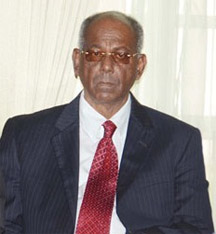PPP Executive member Ralph Ramkarran says the abolition of jury trials should be strongly considered as too many convictions are being overturned on appeal owing to several factors, including inadequate summing up by judges.
Writing in the Weekend Mirror, Ramkarran said this move is necessary to reduce the possibility of guilty offenders escaping justice because of flaws and deficiencies in the justice system.
He said in his article titled ‘Abolish jury trials’ that in recent years, the rate of conviction in jury trials in Guyana had declined considerably, even while taking into account investigatory deficiencies and prosecution lapses.

“Quite apart from deficiencies and lapses, many convictions are overturned on appeal because of inadequate summing up by judges to juries,” he said. Ramkarran went on to explain that at the end of every criminal case tried in the High Court the presiding judge is required to assess the evidence and instruct the jury on the law. He added that the number of appeals which have been upheld for this reason is extremely high.
Last week, the accused in two murder cases – a total of four men – walked free after they appealed their convictions.
“For these reasons, and since Guyana has returned to democratic rule, consideration should be given to the abolition of jury trials with such safeguards as are necessary to protect the rights of accused persons and prevent state interference but at the same time to reduce the possibility of guilty offenders escaping justice because of flaws and deficiencies in our justice system,” Ramkarran said in his article.
He turned his attention to the May 29 edition of the Guyana Chronicle which carried a report of a 25-year-old accused being freed of rape and robbery by a jury of ‘young people’ while describing the outcome as a ‘surprise verdict’.
According to Ramkarran, the article stated that ‘the accused had allegedly committed the offence on a 46-year-old security guard. It was said that after the offence was committed the accused was chased and caught by men who did not lose sight of him’. While addressing other aspects of what was reported, he said the full facts of the case are unknown and as such it was unwise to jump to conclusions. But “this is not the first instance where evidence points clearly in a certain direction and the verdict of the jury then defies explanation,” he said.
“The abolition of jury trials …will enhance the delivery of justice to the public and to those injured or harmed by crimes,” he stated.
Ramkarran wrote in his article that in 1978 the PNC administration proposed the Administration of Justice Bill which sought among other things, to increase the number of offences which could be tried summarily; before a magistrate.
He explained that these offences, known as indictable offences, were heard before a judge and jury. He recalled that there was a lot of opposition to the bill in the legal profession which led to a strike and a picketing demonstration outside Parliament.
He said the bill was eventually passed with some modification but the number of indictable offences reduced or capable of being reduced to summary offences was increased. “It meant that jury trials for a number of offences had been abolished,” he said.
“It is not known whether the suspicions that the government was attempting to abolish jury trials was accurate. Such suspicions about legal and other matters abounded at the time because of the undemocratic nature of the regime in power and the belief that every effort was being made to deprive Guyanese of rights which had long been won… No further attempt was made to expand the list of indictable offences to summary offences which can be tried before a magistrate,” he stated.
According to Ramkarran, trial by jury is considered in some jurisdictions particularly common-law jurisdiction – a category into which Guyana falls- to provide the ultimate safeguard against authoritarianism and the abuse of state power”.
He added that some common law jurisdictions such as India, Pakistan and Singapore have abolished jury trials. He said that in many developed countries which had developed fair judicial systems, such as Germany and Italy, decisions in criminal trials are made by tribunals consisting of a few judges and some citizens sitting together and making decisions on the guilt or innocence of the accused and passing sentence.
“It appears therefore that even though in many countries trial by jury has been abolished or does not exist, there is some form of layperson input in determining guilt or innocence of accused persons because the decision making panels comprise a number of such laypersons. It does not appear that there is any inherent advantage of jury trial over panel trial or vice versa because there has been no fundamental complaint of the quality of justice dispensed in countries without jury trials,” Ramkarran said.





